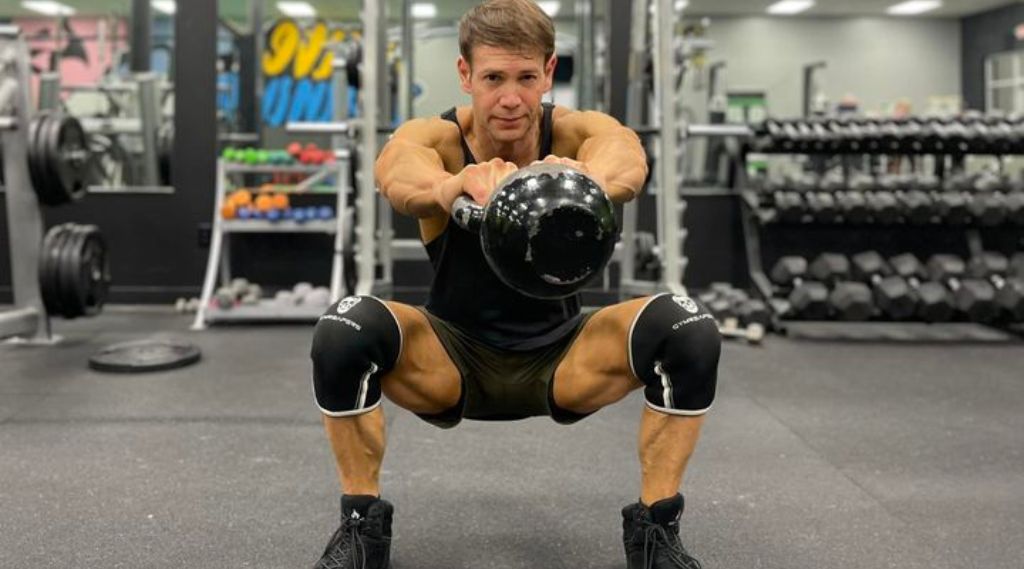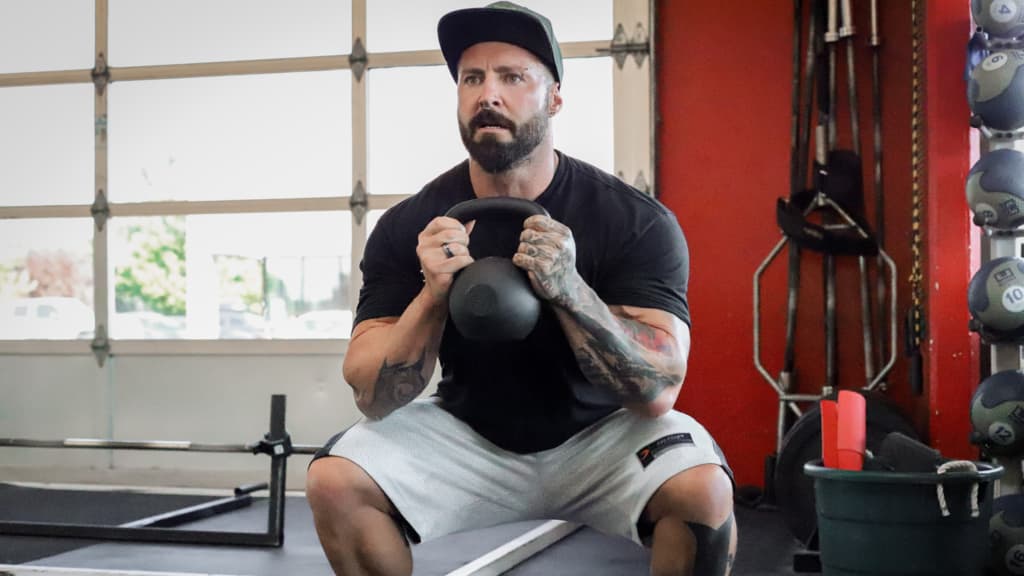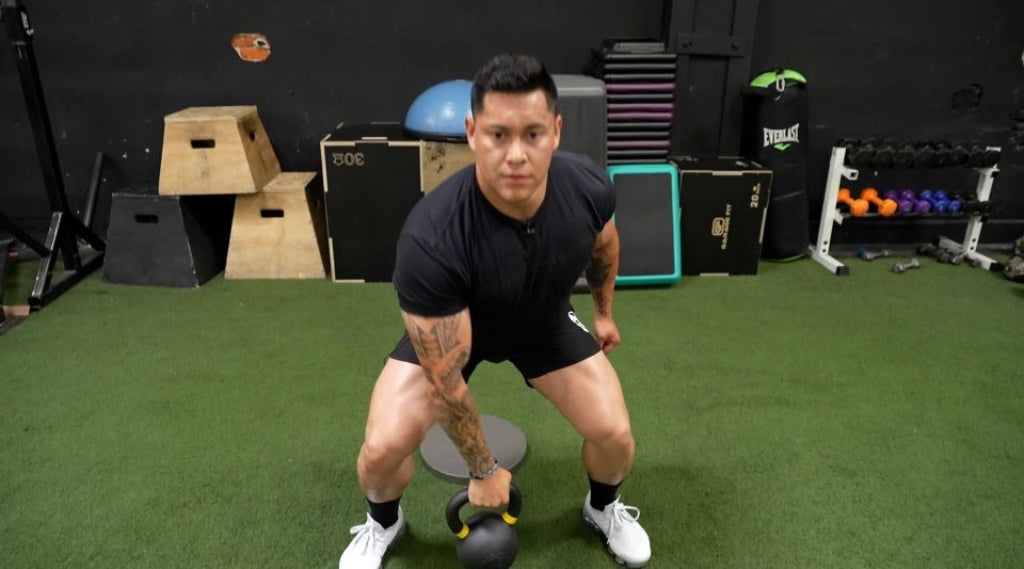If you want to strengthen and grow your hamstrings using kettlebells, then it’s important to choose the right movements and know how to incorporate them into a program.
The 12 best hamstring exercises are:
To help you make the most of your hamstring training with kettlebells, I’ll walk you through each of these exercises and provide you with a sample 4-week workout that you start implementing today.
Key Takeaways
Anatomy of the Hamstring Muscles

The hamstring muscles are located on the posterior thigh and consist of 3 main muscles:
- Biceps femoris (long head & short head)
- Semitendinosus
- Semimembranosus
Together the hamstring muscles are primarily responsible for knee stabilization as well as the bending of the knee (knee flexion). The hamstrings also cross the hip joint, allowing them to assist in hip extension (straightening the hips from a bent position).
The hamstring muscles are important for daily functions like walking and bending over, but they’re most taxed in loaded exercises like the squat and deadlift.
Related Article: Hamstring Exercises With Bands
Benefits of Training the Hamstrings with Kettlebells

The benefits of training your hamstrings with kettlebells include:
12 Best Hamstring Kettlebell Exercises
1. Standing Single Leg Kettlebell Hamstring Curls
Standing single leg hamstring curls put direct tension on your hamstrings, and oftentimes allow for a stronger hamstring contraction due to being in the standing position.
How To
- Stand upright on an elevated box with one foot on the box and one foot fully extended off the box.
- Have a kettlebell wrapped around the handle of the kettlebell and placed over the back of your ankle.
- While holding on to the rack bend the knee and curl the weight up with your ankle.
- Extend the flexed knee to complete the repetition.
- Repeat steps 3 and 4 for the desired amount of repetitions, and then switch to the other leg.
Pro Tip
An important component of standing single leg kettlebell hamstring curls is posture. Using supporting structures such as the rack can help increase stability, which will subsequently allow you to hamstring curl more weight. Increase the duration of the lowering phase to increase the intensity of the contraction which will promote additional hamstring progress.
2. Lying Kettlebell Hamstring Curls
Kettlebell hamstring curls are the most effective kettlebell variation for hamstring isolation.
How To
- Lay down on the edge of a bench or elevated surface with your lower thighs coming off the end.
- Squeeze a kettlebell between your ankles with your legs fully extended.
- Curl your feet back until your knees are completely bent.
- Extend both your knees to complete the repetition.
- Repeat steps 3 and 4 for the desired amount of repetitions.
Pro Tip
Use a slower tempo to get more out of each repetition; the more time your hamstrings spend under tension, the greater the potential for muscle growth.
3. Kettlebell Glute Bridges
Kettlebell glute bridges are a great option for targeting the hamstrings and the glutes. Kettlebell glute bridges can be great for warming up for a squat session, or a great finishing exercise to target the hamstrings.
How To
- Lay on the floor with the kettlebell placed on top of your hip.
- Feet should be flat on the floor with your knees bent 90 degrees.
- While firmly holding the kettlebell over your hip, extend your hips towards the ceiling until they are completely extended.
- Flex your hips to return to the starting position.
Pro Tip
Take advantage of the versatility of kettlebell glute bridges to make complete workouts that revolve around them. You can add tempos, pauses, technique variation, varying intensities, and reps to create a diverse and challenging workout.
Here is an example:
- Heavy kettlebell glute bridges: 5 x 5 @75-85% (challenging weights)
- 4 count lower + 2 count pause kettlebell glute bridges: 3 x 8 @60% (moderate weight)
- High repetition finisher kettlebell glute bridges: 3 x as many reps as possible @50% (lightweight)
4. Kettlebell Single Leg Glute Bridge
Kettlebell single leg glute bridges are great for developing single leg strength, as well as diminishing hamstring muscular imbalances. The kettlebell single leg glute bridge is one of my favorite exercises for glute and hamstring activation before a squat or a deadlift workout.
How To
- Lay on the floor with the kettlebell placed on top of your hip.
- One foot should be flat on the floor bent 90 degrees, and the other should be completely extended off the floor.
- While firmly holding the kettlebell over your hip, extend your hips towards the ceiling until they are completely extended.
- Flex your hips to return to the starting position.
- Switch legs and perform the previous steps on the other leg.
Pro Tip
The further you bring your heels out for this movement the more intense the hamstring contraction will be. Conversely, the closer you bring your feet in, the greater the isolation of the glutes. If you want to target the hamstrings and the glutes, then include both variations in your training (feet out & feet in).
5. Kettlebell Swings
Kettlebell swings are a good option for developing hamstring explosiveness, which can promote power development for compound movements, or explosive sports such as throwing, basketball, or volleyball.
How To
- Stand with your feet a bit further than shoulder-width apart.
- Grab the corners of the kettlebell with each hand.
- Push your hips and the kettlebell back between your legs.
- Focus on loading the hips and the hamstrings.
- Snap the hips forward and let the kettlebell explode forward in front of you.
- Try not to use your shoulders to raise the kettlebell up, and avoid letting the kettlebell travel above shoulder level.
- Pull the weight back between your legs forcefully to complete the repetition.
- Repeat these steps for multiple repetitions.
Pro Tip
Kettlebell swings can be performed as a warm-up or as a core part of your programming. If you want to prime your workout to be more explosive I would suggest adding kettlebell swings before your squats or deadlifts. For example, you could add a 2 x 10 @50% before a lower body workout.
Alternatively, you can load up kettlebell swings to be a more fundamental movement in your workout. For example, you could program 5 x 5 @ 75% for a strength option, or you could program 4 x 12 @ 60% for a hypertrophy option.
6. Kettlebell Single Leg RDL
Single leg RDLs are great for developing balance and are effective for loading the hamstrings up to a greater degree. Single leg RDLs are a less stressful hinge pattern that is great for promoting hamstring health and resiliency.
How To
- Hold a kettlebell in one hand.
- Let the arm hang in front of the opposite balancing leg.
- Initiate by pushing the hips back and letting the non-balancing leg kick back.
- Sit back until the dumbbell is just below the knee.
- Extend at the hips and return to a standing position to complete the rep.
Pro Tip
Single-leg RDLs are lower in intensity than regular deadlifts. Implementing a single leg RDL can allow for greater training frequency or training volume.
For example, to allow for proper recovery throughout the week it is typically advised to train conventional barbell deadlifts 1-2x a week, however with single leg kettlebell RDL you could potentially train more than 2x a week.
7. Kettlebell Deadlift
Deadlifts are a fundamental part of a good workout, and kettlebell deadlifts are a simple and effective way to implement them. Kettlebell deadlifts can also be used in the rehabilitation setting as well.
How To
- Stand over the kettlebell with your feet hip-width apart.
- Let the arms hang as long as possible while sitting the hips back to load the glutes and hamstrings.
- Build as much tension as possible in your upper back by focusing on squeezing the armpits shut.
- Grab the corners of the kettlebell with both hands.
- Pull yourself into the kettlebell as you stand up with the weight.
- In a controlled fashion, push the hips back and let the kettlebell come back to the floor.
Pro Tip
You can make this exercise easier by elevating the surface you are pulling from with a box. A higher or lower box will make this exercise easier or harder. When you’re first starting out you can use a higher box and then slowly work your way to the ground.
A way to make this exercise more difficult would be to add in a pause off the floor, or to stand on a box with the weight being further away from you on the ground. The paused variation will help you build more tension, while standing on the box will increase the range of motion.
8. Kettlebell B-Stance Deadlift
The kettlebell B-stance deadlift allows you to place greater focus on one hamstring while maintaining the stability of your other leg. This variation is also great for diminishing muscular imbalances and loading the desired leg to a greater degree.
How To
- For this exercise, you are going to have a staggered stance with one leg, and one leg slightly bent.
- To load this movement, hold a kettlebell in either both or one of your hands with your arms completely straight in front of you.
- While maintaining a soft bend in both knees, hinge back while allowing the kettlebell to lower below your knee.
- Stand back up with the weight until the hips are completely extended.
Pro Tip
Implementing slower lowering phases during the kettlebell b-stance deadlift can promote greater time under tension, leading to more intense contractions, and subsequently more muscular gains.
9. Kettlebell Good Morning
Kettlebell good mornings are a great hinge movement that can effectively target the hamstrings and posterior chain.
How To
- Hold the kettlebell in front of your upper chest with both hands.
- While maintaining a neutral spine, initiate the rep by pushing the hips back until the upper torso is almost parallel with the floor.
- Lift the torso to return to the starting position.
Pro Tip
Similar to other exercises good mornings can be done slowly with a tempo to achieve intense contractions. Alternatively, they can be performed with a more snappy motion to develop explosiveness; however, it’s important to master the technique before attempting to do this movement explosively.
10. Kettlebell Reverse Lunges
Kettlebell reverse lunges are a compound movement that places a greater emphasis on the glutes and hamstrings while minimizing stress on your joints.
How To
- Hold the kettlebell with both your hands while you’re in the upright position.
- To begin the rep, step back with one foot.
- Bend the back knee toward the floor and allow your front knee to bend and travel forward over your toes.
- Descend until the front knee is bent at 90 degrees, with your heel still planted firmly on the ground.
- To complete the repetition, return the back leg to the starting position by pushing through the front leg.
- Repeat the previous steps until you have achieved equal repetitions for both sides.
Pro Tip
To target your hamstrings effectively, ensure you are pushing through the front leg rather than launching yourself up with the back leg.
You can also experiment with multi-directional lunges to challenge your hamstrings in different lunge movement patterns. For example:
- Forward lunge: x10 each leg
- Side lunge: x10 each leg
- Reverse lunge: x10 each leg
11. Kettlebell Goblet Squats
Kettlebell goblet squats target the glutes, hamstrings, and quads, and are a great exercise for total body muscular development. These are a great alternative for barbell squats for beginners or when you need a low-fatiguing squat option to get in some extra volume.
How To
- Hold a kettlebell at chest level with both hands.
- Initiate with the hips and bend the knees to sit back until the thighs are at or below parallel to the ground.
- Try not to let the weight drop or allow your chest to cave during the rep.
- Stand up until your hips and knees are completely extended.
Pro Tip
A wider stance and hinge-focused kettlebell goblet squat can promote greater hamstring recruitment.
Additionally, performing this exercise for multiple sets of 10-20 reps or doing slow and controlled 4-count lowered reps can increase the difficulty for intermediate to advanced lifters.
12. Kettlebell Back Extension
Back extensions are one of my top exercises for targeting the hamstrings. Furthermore, we can utilize a kettlebell to make this exercise more challenging. However, this requires access to a back extension and is quite challenging to perform.
How To
- Securely fasten your feet in the leg lock of the back extension.
- Hold a kettlebell in both your hands to make this exercise more difficult.
- Start with your knees straight and your torso upright.
- Lower your torso until completely bent.
- Pull yourself back by pulling your heels into the leg locks to return to the starting position.
Pro Tip
If this exercise is difficult, you can begin with either a bodyweight or band assistance until you become strong enough to incorporate kettlebell resistance.
To integrate band assistance you can anchor it to a sturdy point behind you and hold it with both your hands. If band assistance is too easy you can progress to a body weight progression, then subsequently load the exercise with a kettlebell.
Sample Hamstring Workout Routine With Kettlebells
Here is a sample week-to-week kettlebell hamstring workout that you can implement:
Week 1
- Monday
- Kettlebell goblet squat: 3 x 5 @75%
- Kettlebell single leg RDL: 3 x 8 each side @60%
- Standing single leg kettlebell hamstring curls: 2 x Failure
- Thursday
- Kettlebell deadlift: 4 x 10 @60%
- Kettlebell reverse lunges: 4 x 12 @50%
- Kettlebell glute bridges: 4 x 6 @50%
Week 2
- Monday
- Kettlebell goblet squat: 4 x 5 @75% + 5-10 lbs
- Kettlebell single leg RDL: 3 x 8 each side @60% + 5-10 lbs
- Standing single leg kettlebell hamstring curls:: 3 x Failure @30-40% + 5-10 lbs
- Thursday
- Kettlebell deadlift: 4 x 10 @60% + 5-10 lbs
- Kettlebell reverse lunges: 4 x 12 @50% + 5-10 lbs
- Kettlebell glute bridges: 4 x 6 @50% + 5-10 lbs
Week 3
- Monday
- Kettlebell goblet squat: 4 x 5 @75% + 5-10 lbs
- Kettlebell single leg RDL: 3 x 8 each side @60% + 5-10 lbs
- Standing single leg kettlebell hamstring curls:: 3 x Failure @30-40% + 5-10 lbs
- Thursday
- Kettlebell deadlift: 4 x 10 @60% + 5-10 lbs
- Kettlebell reverse lunges: 4 x 12 @50% + 5-10 lbs
- Kettlebell glute bridges: 4 x 6 @50% + 5-10 lbs
Week 4
- Monday
- Kettlebell goblet squat: 4 x 5 @75% + 5-10 lbs
- Kettlebell single leg RDL: 3 x 8 each side @60% + 5-10 lbs
- Standing single leg kettlebell hamstring curls:: 3 x Failure @30-40% + 5-10 lbs
- Thursday
- Kettlebell deadlift: 4 x 10 @60% + 5-10 lbs
- Kettlebell reverse lunges: 4 x 12 @50% + 5-10 lbs
- Kettlebell glute bridges: 4 x 6 @50% + 5-10 lbs
Best Kettlebells For Training Your Hamstrings

Kettlebells are ideal for a variety of dynamic movements to increase hamstring strength, endurance, and power. This involves exercises such as kettlebell RDLs, goblet squats, and good mornings. Having these kettlebells at your disposal is a game changer for achieving well-rounded gains.













Leave a comment
All comments are moderated before being published.
This site is protected by hCaptcha and the hCaptcha Privacy Policy and Terms of Service apply.